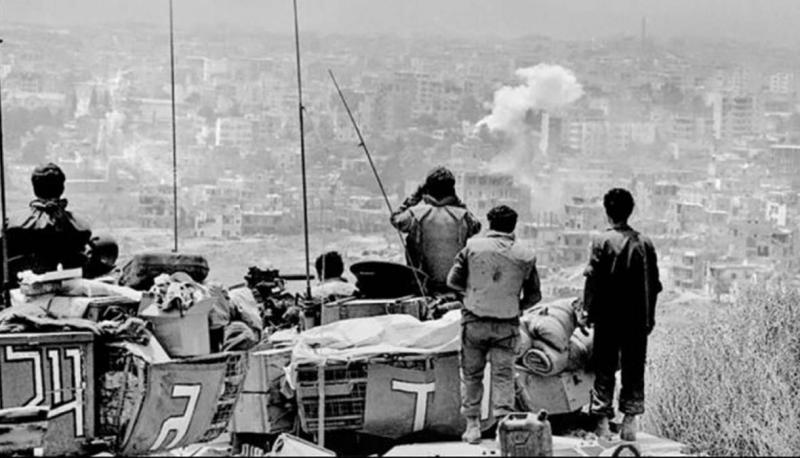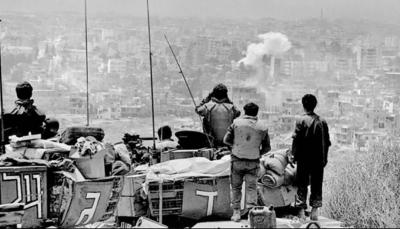The city of Rafah in Gaza today resembles Beirut in 1982 when it was the last stronghold of the Palestine Liberation Organization during the Israeli invasion at that time. However, Rafah is geographically small and narrow, unlike Beirut, which was one of the largest Arab capitals, blending politics, military, thought, and culture, with a large crowd of Arab and foreign journalists, publishing houses, art, and more in a vast city that housed over 25,000 tall buildings, within which thousands of fighters disappeared. In contrast, Rafah is a small island drowned in tents and camps, housing more than one and a half million civilians who have long awaited salvation from war, double the time that Beirut waited, which succumbed within less than three months in favor of civilians, leading the organization to decide to leave the city after the Red Cross received two Israeli prisoners, including a pilot, as well as the corpses of several soldiers. This marked the end of the armed presence of the PLO in Beirut.
Today, Rafah lives the same scene, but the international Red Cross's equation for receiving detainees from Hamas is not available due to stalled negotiations in recent months. In Beirut, the number of prisoners was known, while in Hamas's case, there remains a segment of prisoners about whom Hamas knows nothing, according to both Hamas and Israeli accounts. Moreover, Hamas's insistence on a main idea encapsulating the withdrawal of Israeli occupation from Gaza, in addition to a complete ceasefire, is read by Netanyahu's government as a political defeat, indicating that acceptance of this outcome places the Israeli government in a difficult confrontation with the Israeli public, especially since Netanyahu has announced that the main point is to eliminate Hamas. However, with the situation reaching this zero-sum equation, any Israeli concession could be perceived as a political defeat for the government in the face of Israeli public opinion. The refusal to accept such terms means a continuation of war in Rafah, which precisely implies that Netanyahu is approaching Gaza while keeping Sharon's option in Beirut in mind. This option, based on military deduction, faces international rejection due to the accumulation of civilians in Rafah, against the backdrop of a limited deal hinted at by American media.
Thus, Gaza truly stands at a crossroads: if the war concludes with a military resolution, the members of the Izz ad-Din al-Qassam Brigades and their Gaza faction partners would face a scenario reminiscent of Guantanamo Bay. If there is a deal, matters head towards Sharon's option in Beirut, which signifies outlining the features of a departure plan. In the case of Beirut, the situation was very different, as the transfer of the PLO to some Arab countries was plausible, whereas in Gaza, there are significant obstacles, the most prominent being Hamas's stance prior to the war that aligned with the Iranian axis. The movement has tightened its ties with Iran and distanced itself from influential Arab capitals, not to mention its role in the Palestinian division and its turn towards military options, which ultimately led Gaza to this tragic situation.
The second pivotal point relates to what happened on October 7 within the settlements surrounding Gaza, specifically the victims of the outdoor concert that Israel claims included nationals from over 20 different countries, along with foreign casualties and hostages. This indicates that leaders of the Izz ad-Din al-Qassam Brigades face scrutiny if even one of those nations with citizens affected were to make claims before the International Criminal Court, representing a legal obstacle for the reception of al-Qassam leaders and elements, as there lies a significant legal dilemma ahead.
What the law cannot achieve, deals can bring about, so what is the possible deal if Hamas agrees to depart from Gaza, especially since the political wing of the movement today seeks to find an alternative location? This could be Sana'a under the control of the Houthis or Beirut under the control of Hezbollah, indicating that paving the way for the political leadership of Hamas to relocate to Beirut and Sana'a is one of the beginnings of a possible deal. However, the exit of al-Qassam to Beirut faces widespread rejection in Lebanon, unlike the Houthi group, which seeks to strengthen its grip on Sana'a by any incoming element, continuing to recruit even children for this purpose.
What lies ahead—an invasion and a pseudo or real war? What are the consequences? Is it the Guantanamo of Gaza or Sharon's option in Beirut, which Netanyahu still clings to until the last moment, as he believes it will protect him from falling and facing a long-delayed court appearance?




